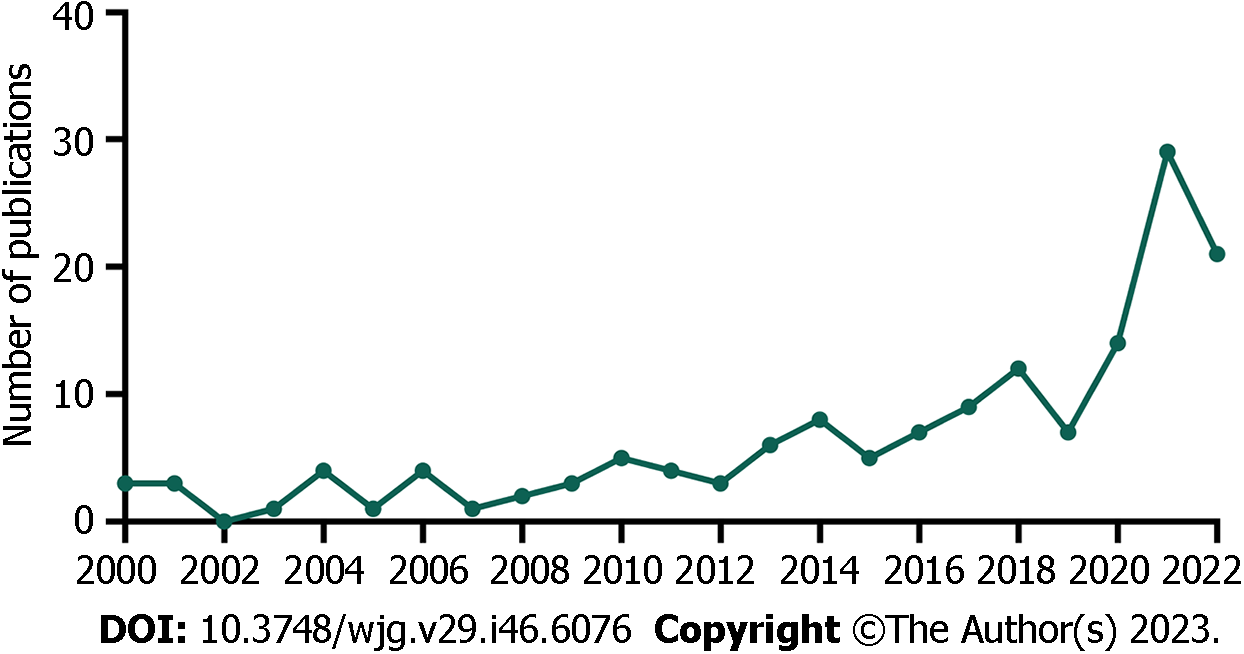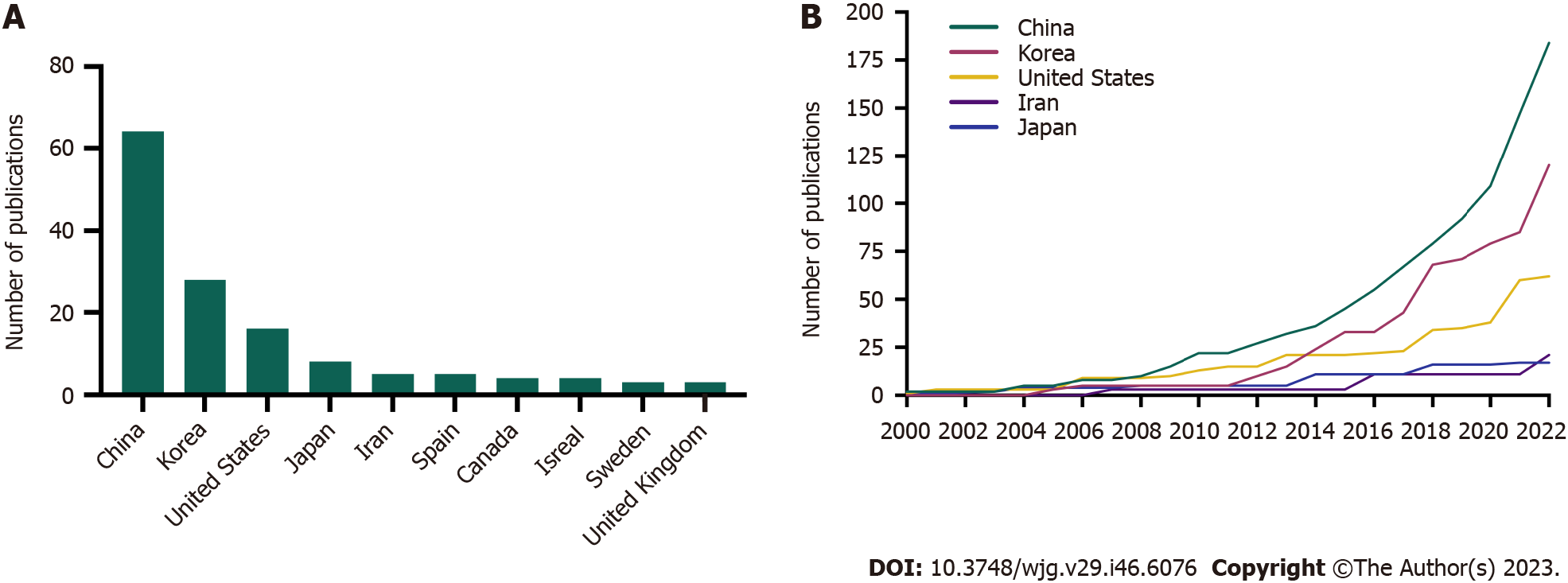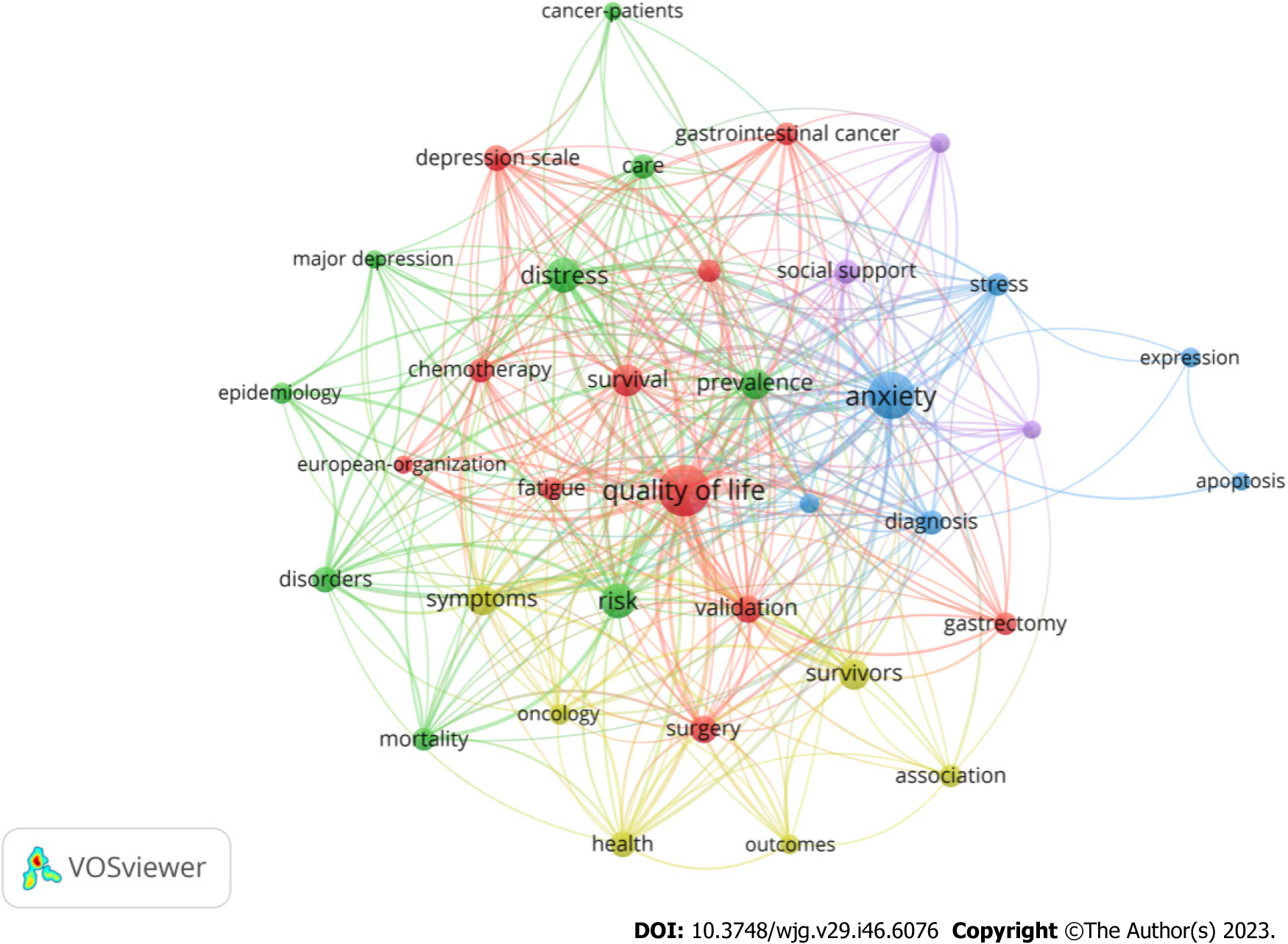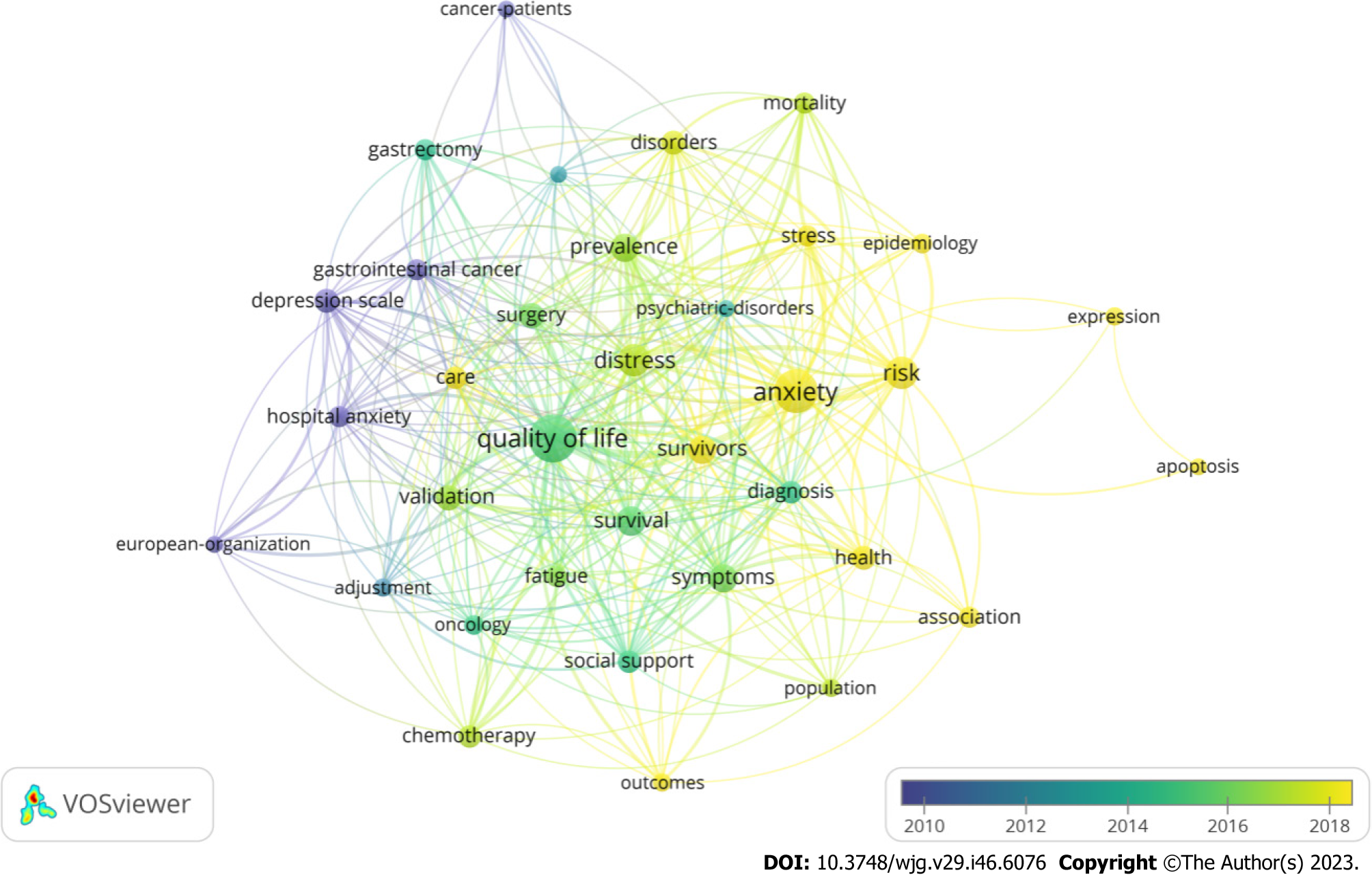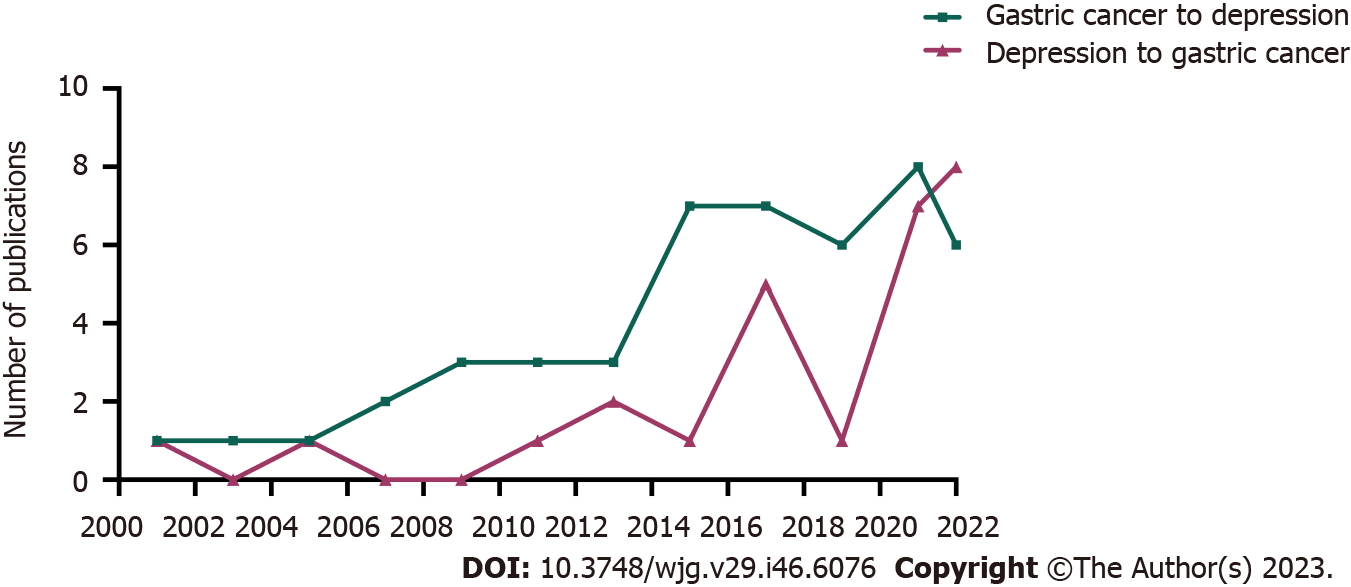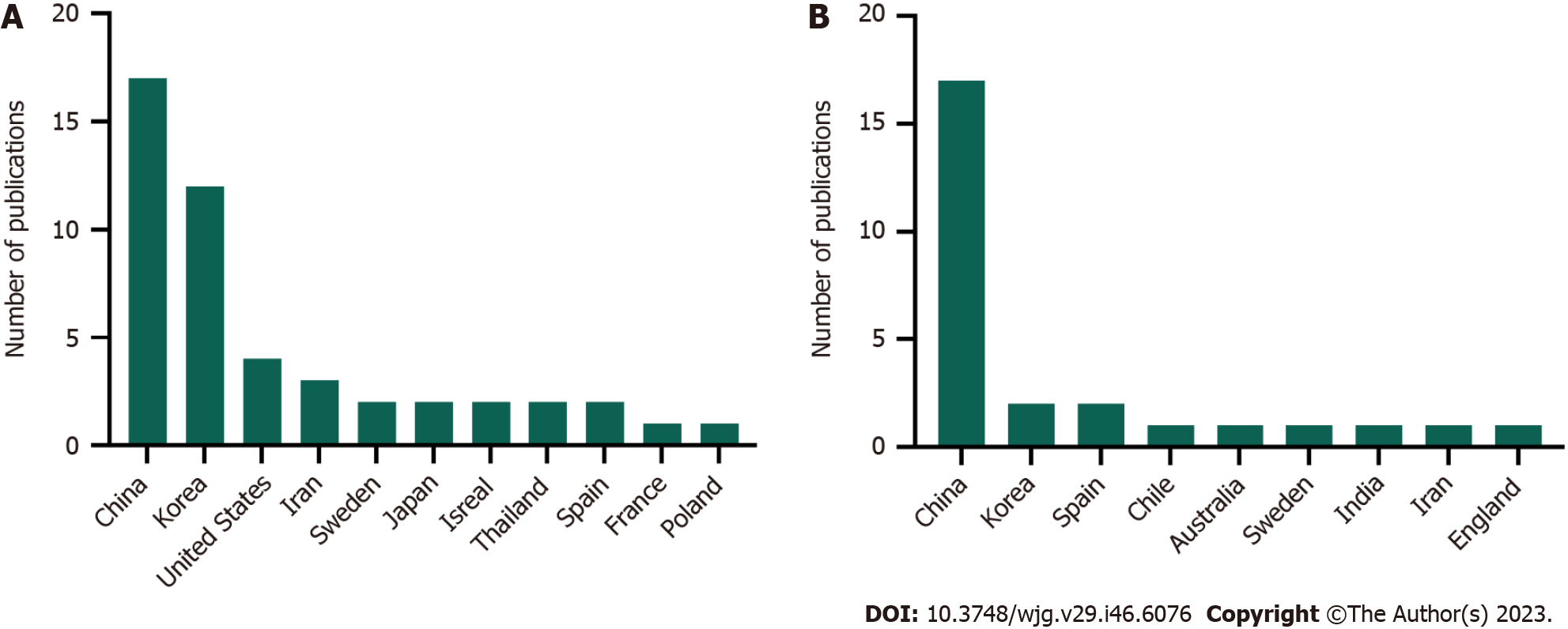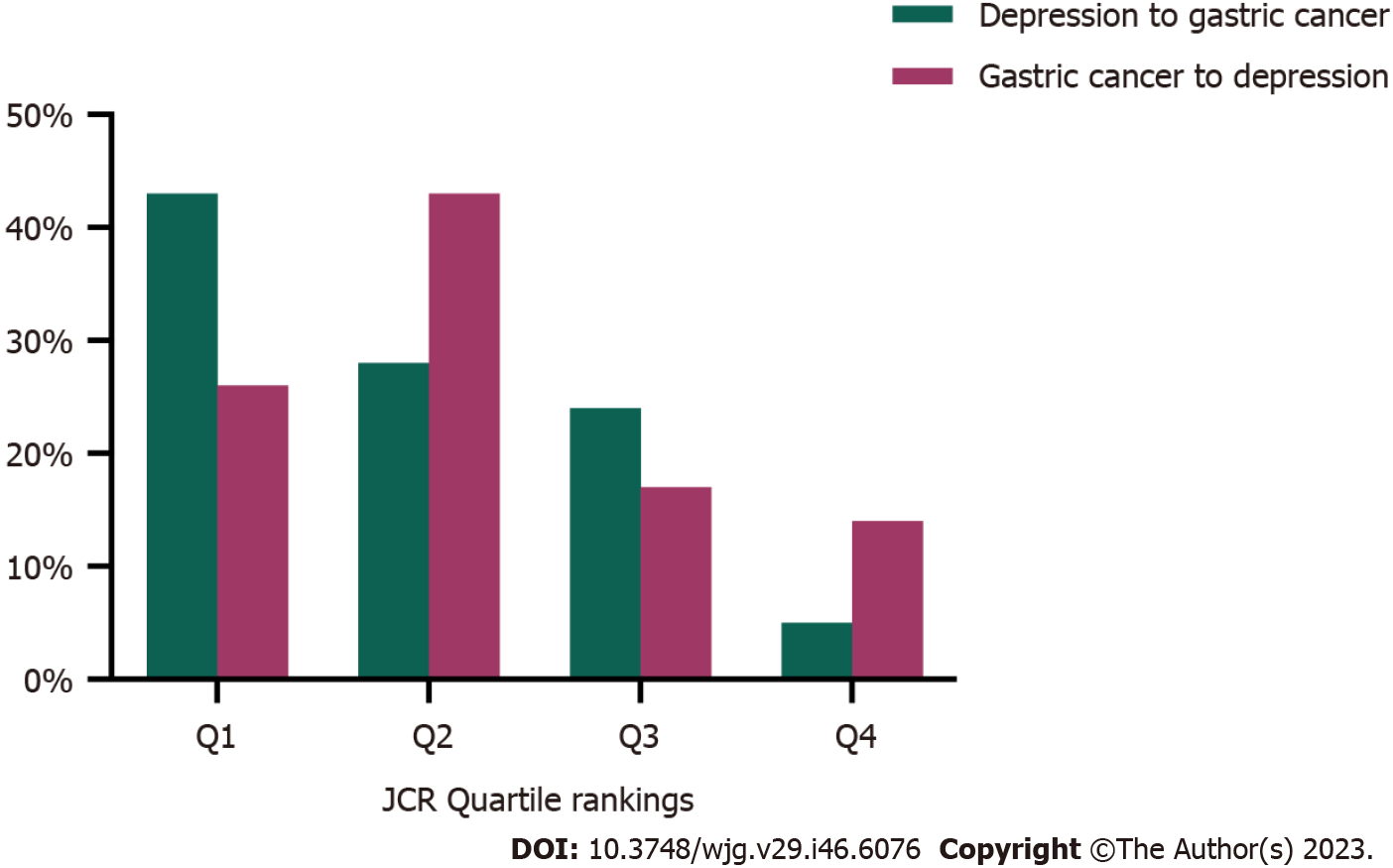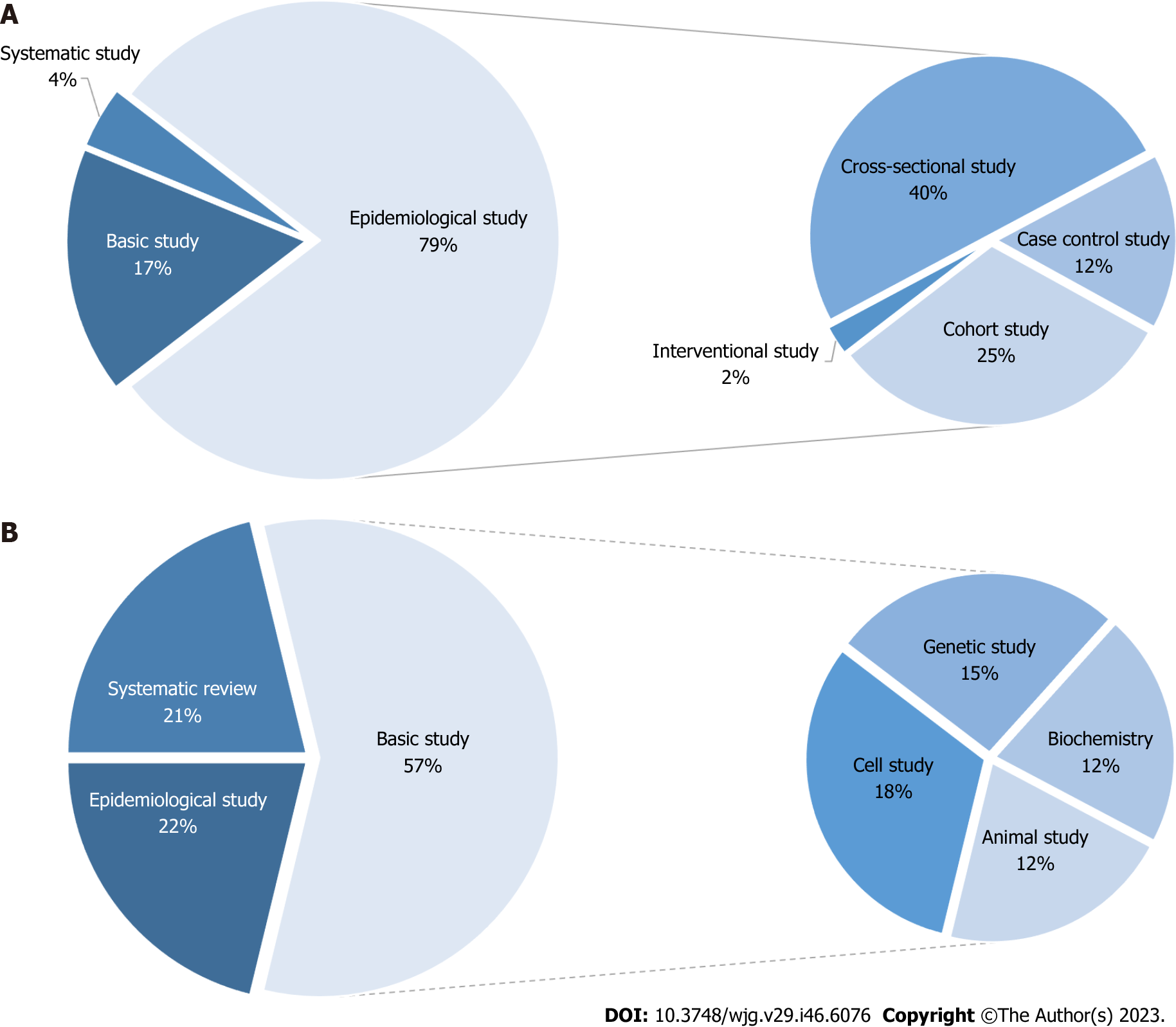Published online Dec 14, 2023. doi: 10.3748/wjg.v29.i46.6076
Peer-review started: September 1, 2023
First decision: October 23, 2023
Revised: November 2, 2023
Accepted: December 2, 2023
Article in press: December 2, 2023
Published online: December 14, 2023
Processing time: 103 Days and 3 Hours
A significant relationship between gastric cancer (GC) and depression has been found in the last 20 years. However, there is no comprehensive information that helps researchers find popular and potential research directions on GC and depression.
To determine the research status and hotspots by bibliometric analysis of relevant publications on the relationship between GC and depression.
We used the Web of Science Core Collection to search and collate the literature on GC and depression from 2000 to 2022 on 31 May, 2023. Then, visualization analysis was performed using VOSviewer software (version 1.6.19) and the Bibliometrix package in R software.
We retrieved 153 pertinent publications from 2000 to 2022. The annual publication count showed an overall upward trend. China had the most prominent publications and significant contributions to this field (n = 64, 41.83%). Before 2020, most studies focused on “the effect of GC on the development and progression of depression in patients.” The latest research trends indicate that “the effect of depression on the occurrence and development of GC and its mechanism” will receive more attention in the future.
The study of “the effect of depression on the occurrence and development of GC and its mechanism” has emerged as a novel research theme over the past two years, which may become a research hotspot in this field. This study provides new insights into the hotpots and frontiers of the relationship between GC and depression, potentially guiding researchers toward hot research topics in the future.
Core Tip: Gastric cancer (GC), the most common malignant tumour in the digestive system, has the third-highest mortality rate and the fifth-highest morbidity rate among all cancers. In recent years, some researchers have paid attention to the impact of depression on the occurrence and development of GC and tried to explore the interaction mechanism, which has become an emerging research trend in GC and depression. Bibliometric analysis is a popular and rigorous method for quantitative analysis of large volumes of scientific literature data. It is necessary to investigate the relationship between GC and depression. However, as far as we know, there is no bibliometric study on GC and depression. This study shows the hotspots and frontiers of GC and depression on a global level.
- Citation: Liu JY, Zheng JQ, Yin CL, Tang WP, Zhang JN. Hotspots and frontiers of the relationship between gastric cancer and depression: A bibliometric study. World J Gastroenterol 2023; 29(46): 6076-6088
- URL: https://www.wjgnet.com/1007-9327/full/v29/i46/6076.htm
- DOI: https://dx.doi.org/10.3748/wjg.v29.i46.6076
Gastric cancer (GC), the most common malignant tumour in the digestive system, has the third-highest mortality rate and the fifth-highest morbidity rate among all cancers[1]. As the most common mental disorder, depression is particularly prevalent in cancer patients in recent studies[2-4]. At present, the discussion on the pathogenesis of depression is quite rich, mainly including miRNAs that disorderly expressed[5], receptors and their gene abnormality[6], cerebral structural and functional changes[7]. On the one hand, cancer patients often experience painful emotional reactions, some of which can manifest as depression. On the other hand, depression affects the attitude of cancer patients toward cancer and adherence to drug treatment and the endocrine and immune function, which in turn affects cancer progression[8]. There is increasing evidence that mental disorders such as depression are associated with the incidence and progression of cancer[8-11].
The current research status on the relationship between cancer and depression is still unknown. Studies have focused on research topics such as breast cancer and depression[11,12], lung cancer and depression[13], and colorectal cancer and depression[14]. In recent years, some researchers have paid attention to the impact of depression on the occurrence and development of GC and tried to explore the interaction mechanism, which has become an emerging research trend in GC and depression.
Bibliometric analysis is a popular and rigorous method for quantitatively analyzing large volumes of scientific literature data. Based on the databases of academic publications, such as Pubmed, Web of Science, and Scoups, can reveal the status, hotspots, and emerging trends in a particular research field[15]. It can provide comprehensive information that helps researchers find popular and potential research directions in specific disciplines.
It is necessary to investigate the relationship between GC and depression. However, as far as we know, there is no bibliometric study on GC and depression. Therefore, this study aims to provide an overview of the research status on the relationship between GC and depression by bibliometric analysis. Furthermore, we tried to propose the hotspots, evolution trends, and future research advancement patterns in this field. In addition, future research patterns are forecast based on evaluating bibliometric results in this field.
We selected the Web of Science Core Collection (WOSCC) for the literature collection. WOSCC is the world’s leading citation database. It contains records of articles from the highest-impact journals worldwide, including open-access journals, conference proceedings, and books. Notably, the coverage of specific titles extends back to the year 1900[16,17]. This comprehensive and extensive database provides a robust foundation for our bibliometric analysis.
We focused on the WOSCC, collecting the literature on “GC and depression”. Then, we searched and exported the relevant articles to the WOSCC on 31 May, 2023. Our search strategy was as follows: Topic = (stomach neoplasm OR stomach cancer OR stomach tumour stomach carcinoma OR gastric carcinoma OR gastric carcinoma or gastric cancer OR gastric neoplasm OR gastric tumour AND TS = depression OR depressive disorder OR depressive symptom. The retrieval time range was from 1 January, 2000 to 31 December, 2022. We included only articles, reviews, and systematic reviews to facilitate further literature content analysis, excluding irrelevant publications.
We used an Excel spreadsheet to collect bibliometric indicators: The total number of publications, the year of publication, the top ten countries, the Journal Citation Reports (JCR) Quartile rankings of the source journals, the top 5 citations, and the research types.
In addition, we utilized the Bibliometrix package of R-studio software to analyze the included literature data and Biblioshiny for data visualization. In this study, we examined the top ten countries contributing to the field of GC and depression and the annual publication trend for each country.
We used VOSviewer software (Version 1.6.19) for keyword co-occurrence analysis to visualize networks of keywords. The network focuses on understanding a particular field’s knowledge composition and structure by studying the links between keywords in the article. By drawing the keywords co-occurrence visualization maps, we can identify the hotspots and frontiers in “GC and depression”.
For the classification of publications, we divided the research on the correlation and interaction mechanism between GC and depression into two groups: “GC to depression” and “depression to GC.” Based on the above grouping, we used the 2022 JCR Quartile rankings to classify the publications within the two groups. The journal sources not existing in the JCR Quartile rankings were excluded. Additionally, we classified the two research groups according to the classification standard of medical studies[18], which is based on research methodologies.
In the WOSCC, we retrieved 153 publications on “GC and depression”. The number of publications on this topic has generally increased from 2000 to 2022, indicating a growing interest in this field among researchers. A more rapid growth in the number of publications was observed from 2019 to 2021, with 2021 recording the highest annual number of articles (n = 29) (Figure 1).
Over the past 22 years, at least 21 countries have published relevant papers on “GC and depression”. The top ten countries issued 140 articles, accounting for 90.32% of the total publications in this field (Figure 2A). The most significant number of publications was from China (n = 64), the total number of publications is 7287986, followed by South Korea (n = 28), the total number of publications is 1368778, and the third was the United States (n = 16), the total number of publications is 210673. From the trend of annual publications of the top ten countries, China has the most significant increase and the fastest growth rate, followed by South Korea and the United States (Figure 2B).
We imported the publication related to “GC and depression” in the WOSCC into VOSviewer (version 1.6.19) software, selected all keywords (including author keywords and keywords plus) that occurred more than five times, and divided these keywords into five clusters with a different color (Figure 3). The five cluster are “effect of treatments on GC patients with mental disorders” (cluster 1, red), “epidemiological researches on GC and depression” (cluster 2, green) “diagnosis of GC causing mental disorders and the interaction mechanism” (cluster 3, blue) “outcomes of GC patients” (cluster 4, yellow) and “social support of mental disorders in GC patients” (cluster 5, purple).
In cluster 1, the high-frequency keywords are quantity of life, depression scale, gastrectomy, and chemotherapy. In cluster 2, the high-frequency keywords are risk, prevalence, epidemiology, and mortality. In cluster 3, the high-frequency keywords are diagnosis, anxiety, expression, and apoptosis. In cluster 4, the high-frequency keywords are survivors, symptoms, association, and outcomes. In cluster 5, the high-frequency keywords are adjustment and social support. These results indicate that “GC and depression” included five research directions from 2000 to 2022.
Overlay visualization is shown in Figure 4. The keywords colored purple mean the average year of the appearance of the keyword is earlier than other colors. Keywords colored yellow means the average year of the appearance of the keyword is later. Before 2012, the hospital anxiety and depression scale of patients with GC was the most concerned topic (purple). Then, researchers gradually turned to the psychological adjustment, quality of life, and diagnosis of patients with GC (green). In recent years, researchers have paid more and more attention to the association between GC and depression, the mechanism of interaction between the two, and the risk factors (yellow) (Figure 4).
From 2000 to 2022, the number of publications on “GC to depression” and “depression to GC” showed an increased trend. Compared with the first research on “depression to GC” published in 2004, the research on “GC to depression” published earlier, was published in 2001. In addition, the number of publications of “GC to depression” was higher than “depression to GC” before 2020 and was lower after 2020 (Figure 5).
From 2000 to 2022, the number of publications on “GC to depression” is 48, and “depression to GC” is 27. China is the most active country in both groups, followed by South Korea. Furthermore, China has a higher proportion of publications in “depression to GC” than other countries (n = 17, 63%) (Figure 6).
We analyzed the JCR Quartile rankings results for the two groups. The JCR Quartile rankings of publications on “GC to depression” were distributed as follows: Q1 (26%), Q2 (43%), Q3 (17%), and Q4 (14%). However, the JCR Quartile rankings of publications on “depression to GC” were Q1 (43%), Q2 (28%), Q3 (24%), and Q4 (5%). Compared with “GC to depression”, there were more publications on “depression to GC” in Q1. Furthermore, publications on “depression to GC” in Q4 only accounted for 5%, which was less than “GC to depression” (Figure 7).
We summarized the top five most frequently cited publications in “GC to depression” and “depression to GC”, respectively. Brintzenhofe-Szoc et al[19], published in Psychosomatics in 2009, had the most cited frequency in “depression to GC” (frequency of cited = 226). Lee et al[20], published in the Journal of Neurogastroenterology and Motility in 2015, had the most cited frequency in “depression to GC” (frequency of cited = 84) (Tables 1 and 2).
| Ranking | Authors | Title | Journal | Time cited |
| 1 | Brintzenhofe-Szoc et al[19] | Mixed Anxiety/Depression Symptoms in a Large Cancer Cohort: Prevalence by Cancer Type | Psychosomatics | 226 |
| 2 | Nordin et al[36] | Predicting anxiety and depression among cancer patients: a clinical model | European Journal of Cancer | 121 |
| 3 | Hong and Tian[37] | Prevalence of anxiety and depression and their risk factors in Chinese cancer patients | Supportive Care in Cancer | 118 |
| 4 | Tavoli et al[54] | Anxiety and depression in patients with gastrointestinal cancer: does knowledge of cancer diagnosis matter? | BMC Gastroenterology | 98 |
| 5 | Kim et al[40] | Prevalence and prognostic implications of psychological distress in patients with gastric cancer | BMC Cancer | 68 |
| Ranking | Authors | Title | Journal | Time cited |
| 1 | Lee et al[20] | The Effect of Emotional Stress and Depression on the Prevalence of Digestive Diseases | Journal of Neurogastroenterology and Motility | 84 |
| 2 | Shi et al[38] | Catecholamine up-regulates MMP-7 expression by activating AP-1 and STAT3 in gastric cancer | Molecular Cancer | 72 |
| 3 | Bica et al[39] | Depression as a Risk Factor of Organic Diseases: An International Integrative Review | Journal of Nursing Scholarship | 38 |
| 4 | Nan et al[55] | Effects of depression on parameters of cell-mediated immunity in patients with digestive tract cancers | World Journal of Gastroenterology | 23 |
| 5 | Huang et al[44] | Depression accelerates the development of gastric cancer through reactive oxygen species-activated ABL1 (Review) | Oncology Reports | 21 |
Our analysis revealed that the most prevalent research method in “GC to depression” was the epidemiological research method, among which cross-sectional studies accounted for 40%, followed by cohort studies. In “depression to GC”, the most used is the basic research method, including cell, gene, animal, and biochemical research methods (Figure 8).
This study is the first bibliometric analysis of the relationship between GC and depression, providing a potential opportunity to explore the interaction mechanism further. This study analyzed the global publications on GC and depression from 2000 to 2022. The results showed an increasing trend in the annual number of publications in this field. In addition, we could conclude that China and South Korea are the most productive countries in GC and depression. According to the global statistics of GC in 2020, the incidence of GC in China and South Korea is among the top five, and the disease burden is heavy[21]. Therefore, there is more research on GC in China and South Korea than in other countries, and the increase in annual publication volume is relatively significant.
The keyword co-occurrence analysis of the research on GC and depression revealed the distribution of research topics in this field from 2000 to 2022. Combining the overlay visualization, we could present the research hotspots and frontiers in the field. Most researchers focus on which cancer patients are often accompanied by depression and the incidence of depression in GC patients. Kouhestani et al[22] estimated the prevalence of depression in GC patients globally based on WHO region classification. They found that 37% of GC patients were accompanied by depression. Regionally, the Eastern Mediterranean region has the highest prevalence of depression in GC patients among all WHO regions. The results suggested that depression is high among GC patients.
Depression could affect the overall health of GC patients. GC patients with depression might significantly impact their quality of life, prognosis, and survival rate[23]. Therefore, researchers have also shown significant interest in the quality of life of GC patients with depression and its improvement. The diagnosis and treatment of GC might impact the psychological condition of patients[24]. Some interventions, such as proper social support[25] and multidisciplinary cooperative continuous nursing[26], could relieve the depression of GC patients.
The research on the interaction mechanism between GC and depression from the perspective of epidemiological[27,28], cellular[29,30], and genetic[30,31]levels became an emerging research topic. This trend might be due to the many kinds of research on hot topics published during this period, revealing innovative explanations emerging from new research fields. For example, the gut-brain axis theory established bidirectional interactions among the brain, the gut, and the gut microbiome[32,33]. Furthermore, many prospective epidemiological studies have shown that depression is a risk factor for cancer[12,34]. In addition, some studies have confirmed that depression is a risk factor for digestive carcinoma and proposed a mechanism for it[35]. These innovative explanations provided new ideas for exploring the interaction mechanism of GC and depression.
This study indicated that in “GC to depression”, the top five most highly cited publications are epidemiological studies, such as the prevalence, mortality, and risk factors of GC patients with depression. This result was also consistent with cluster 2 in the keyword co-occurrence analysis (Figure 3, green). The publication most frequently cited was Brintzenhofe-Szoc et al[19], entitled “Mixed Anxiety/Depression Symptoms in a Large Cancer Cohort: Prevalence by Cancer Type”, published in Psychosomatics in 2009. This study found that mixed anxiety/depression has a high incidence of gastric, pancreatic, head and neck, and lung cancer. The second most cited publication was by Nordin et al[36] from the European Journal of Cancer. This study indicated that levels of anxiety and depression at diagnosis predict a similar status 6 mo later, and the hospital anxiety and depression scale, combined with a single question about social support, maybe a suitable screening tool for clinical use. The third most cited publication was by Hong and Tian[37] from Supportive Care in Cancer. This study showed that depression level was high among Chinese cancer patients. Patients with lung, esophagus, cervix, liver, and stomach cancers were the high-risk groups for depression.
In “depression to GC”, researchers mainly focus on the mechanism. The most highly cited was by Lee et al[20], entitled “The Effect of Emotional Stress and Depression on the Prevalence of Digestive Diseases”, published in the Journal of Neurogastroenterology and Motility in 2015. This study showed depression was associated with peptic ulcer disease, adenoma/colon cancer, and GC. Depression was an independent risk factor for gastric adenoma/GC and might be a cause of GC. The second cited publication was by Shi et al[38] from Molecular Cancer. This study found that up-regulation of matrix metalloproteinase-7 expression through beta 2-adrenergic receptors (AR)-mediated signaling pathway is involved in the invasion and metastasis of GC. The third cited publication was by Bica et al[39] from the Journal of Nursing Scholarship. This study indicated that mechanisms connecting depression to physical illness appear to involve alterations in the hypothalamic-pituitary axis, unhealthy lifestyle, chronic or acute stressors including posttraumatic stress, an increase in C-reactive protein in men, taking antidepressant medication, and social and emotional loneliness.
We further analyzed the publications on “GC to depression” and “depression to GC”. We found that the number of publications in China ranked first in both groups, especially in “depression to GC”. Compared with other countries, China focused on the impact of depression on GC patients and the mechanism of it earlier. In addition, we found that research on “depression to GC” was mainly published in Q1 journals, indicating that this research topic might become an exciting research direction in the future.
In “GC to depression”, the most research type was epidemiological study, among which 40% were cross-sectional studies. For example, Kim et al[40] designed a cross-sectional study and found that depression is common in patients with all stages of GC and is associated with worse outcomes. Kwon et al[27] designed a case-control study and identified a significant relationship between GC and depression among South Korean adults, especially among female patients between 60 and 69 years old of high income and living in metropolitan regions. In addition, Liu and Wang et al[41] conducted a prospective cohort study and found that postoperative depression gradually worsened, relating to poor prognosis, and the degree of malignancy in GC patients is positively correlated with the severity of depression.
In “depression to GC” was mainly basic studies. In recent years, there has been a significantly increased number of publications on the mechanism of depression to GC. This trend might be due to recent epidemiological evidence indicating that mental disorder is a risk factor for GC, but the mechanism is still unclear[20,42,43]. There are four basic study types in “depression to GC”: cell study, genetic study, biochemistry, and animal study. This result showed that researchers mainly focused on how depression affects the occurrence and development of GC and conducted research based on animal, cell, gene, and biochemistry levels.
As mentioned above, Shi et al[38] confirmed the effect of depression on GC at the genetic level in 2010. Other researchers have found that oxidative stress (OS) is related to GC and depression. Huang et al[44] found that high levels of reactive oxygen species (ROS) can activate ABL1 in response to OS. That triggered ABL1 subsequently contributed to the development of GC via interactions with the downstream targets and corresponding signaling pathways. Based on this study, they further explored the mechanism and found that ROS-activated ABL1 mediates inflammation by regulating NF-kappa B1 and STAT3, which subsequently leads to the development of GC and GC-related depression[45]. In addition, Pan et al[46], based on the study by Shi et al[38], found that catecholamine-induced neuroendocrine phenotypes of GC cells led to depression-accelerated GC invasion and metastasis via the beta(2)-AR/metastasis-associated with colon cancer 1 (MACC1) axis, while beta(2)-AR antagonist or MACC1 silencing could reverse it, showing promising potential therapeutic strategies for improving the outcome of GC patients with comorbid depression. These studies built a foundation for future research on the mechanism of “depression to GC”.
The causal relationship between depression and GC merits deeper investigation, which could yield valuable insights into the mechanisms at play. As mentioned above, there have already been population, individual, cellular, molecular, and genetic studies, and some researchers have established animal models. However, there is still a lack of interaction mechanism research on GC and depression at a systematic level. We noticed that depression belongs to the abnormalities of the central nervous system, and GC belongs to the diseases of the digestive system. However, there is still a lack of research on the mechanism of “depression to GC” at the systemic level. As mentioned above, researchers have focused on the association between the central nervous system and other system diseases. For example, Guida et al[31] found that changes in gut bacterial composition might cause altered responses in affective behaviors via several concurring cellular and molecular mechanisms. Their findings offered the first step towards new insights into microbiota’s obscure role in central nervous system functioning. Extricating these pathways may lead to new therapeutic approaches in pathologies showing comorbidity between gastrointestinal disorders and psychiatric illness. Van Kessel et al[32] found that an abundance of bacterial tyrosine decarboxylase in the proximal small intestine could explain the increased dosage regimen of levodopa treatment in Parkinson’s patients. This study suggested that there was an association between the central nervous system and the digestive system. In addition, Mediavilla[47] also found that the importance of gut-brain communication in health and disease, especially the orexin/hypocretin system, bidirectional crosstalk, plays a significant role in various gastrointestinal disorders.
In addition, the nervous system is essential in regulating immune responses to various diseases[48]. Reiche et al[49] proposed that stress and depression impair the immune response and might promote the initiation and progression of some types of cancer. Therefore, studying the bidirectional communication between the neuroendocrine and immune systems could contribute to new clinical strategies. Kuol et al[50] presented three approaches to the neuro-immune interaction in cancer progression: lymphoid organs innervation, neurotransmitters, and immune cells in cancer, tumor-associated immune cells, and the nervous system. Cortese et al[51] indicated that the interaction between nerves and immune cells is critical to cancer growth. There is an interaction between cancer progression and the nervous system[52]. Martyn et al[53] showed that Schwann cells, which are the most prevalent neuroglia within the peripheral nervous system, could attract different subsets of immune regulators and augment their ability to suppress the effector T cells and up-regulate invasiveness of tumor cells. These studies provided a new perspective for further exploration[54,55].
Based on this, we speculate that the researcher can also explore the mechanism of depression affecting GC from the perspective of the association between the central nervous and other systems in the future. Furthermore, providing nuanced insights into the severity of depression could enrich the study’s findings. Given that depression spans a spectrum ranging from mild to severe, it would be advantageous to elucidate the varying degrees of depression and their potential correlation with the incidence of GC.
This study shows the hotspots and frontiers of GC and depression on a global level. According to the increased trend of publications, the number of publications in the future might continue to increase. Between 2000 and 2022, China and South Korea contributed the most to the relationship between GC and depression. The “effect of treatments on GC patients with mental disorders” and “epidemiological research on GC and depression” have always been the research hotspots in the field. The “interaction mechanism between GC and depression” has emerged as a research frontier in recent years, which can be divided into two groups: “GC to depression” and “depression to GC”.
The primary research type of “GC to depression” was epidemiological study represented by cross-sectional studies. In contrast, the primary research type of “depression to GC” was basic study, which focused on the mechanism, and it has shown a significantly increased trend in the past two years. “The mechanism of depression effect on the occurrence and development of GC” will be a frontier in the research field of GC and depression in the future. This study is also the starting point for further discussion. At the same time, since its mechanism was still unclear, it shows the necessity of further analysis.
Depression is particularly prevalent in cancer patients in recent studies, and gastric cancer (GC) is the most common malignant tumour in the digestive system. There is increasing evidence that mental disorders such as depression are associated with the incidence and progression of cancer. Some researchers have paid attention to the impact of depression on the occurrence and development of GC, which has become an emerging research trend in GC and depression.
Present the research status and explore the hotspots for frontier studies using bibliometric analysis of relevant publications on the relationship between GC and depression.
We focused on the Web of Science Core Collection, collecting 153 pieces of literature on “GC and depression”. The retrieval time range was from 1 January, 2000 to 31 December, 2022. We included only articles, reviews, and systematic reviews.
We used an Excel spreadsheet to collect bibliometric indicators. In addition, we utilized the Bibliometrix package of R-studio software to analyze the included literature data and Biblioshiny for data visualization.
The annual publication count showed an overall upward trend. China had the most prominent publications and significant contributions to this field. The effect of depression on the occurrence and development of GC and its mechanism will receive more attention in the future.
The effect of depression on the occurrence and development of GC and its mechanism may become a research hotspot. This study provides new insights into the hotpots and frontiers of the relationship between GC and depression.
This study shows the number of publications on GC and depression in the future might continue to increase. This study is the starting point for further research on the mechanism of depression’s effect on the occurrence and development of GC. Since the mechanism was still unclear, it shows the necessity of further analysis.
Provenance and peer review: Unsolicited article; Externally peer reviewed.
Peer-review model: Single blind
Specialty type: Gastroenterology and hepatology
Country/Territory of origin: China
Peer-review report’s scientific quality classification
Grade A (Excellent): 0
Grade B (Very good): B
Grade C (Good): C
Grade D (Fair): 0
Grade E (Poor): 0
P-Reviewer: Alkhatib AJ, Jordan; Tanabe S, Japan S-Editor: Lin C L-Editor: A P-Editor: Yuan YY
| 1. | Bray F, Ferlay J, Soerjomataram I, Siegel RL, Torre LA, Jemal A. Global cancer statistics 2018: GLOBOCAN estimates of incidence and mortality worldwide for 36 cancers in 185 countries. CA Cancer J Clin. 2018;68:394-424. [RCA] [PubMed] [DOI] [Full Text] [Cited by in Crossref: 53206] [Cited by in RCA: 55814] [Article Influence: 7973.4] [Reference Citation Analysis (132)] |
| 2. | Freeman M. The World Mental Health Report: transforming mental health for all. World Psychiatry. 2022;21:391-392. [RCA] [PubMed] [DOI] [Full Text] [Cited by in Crossref: 71] [Cited by in RCA: 74] [Article Influence: 24.7] [Reference Citation Analysis (1)] |
| 3. | Stein DJ, Benjet C, Gureje O, Lund C, Scott KM, Poznyak V, van Ommeren M. Integrating mental health with other non-communicable diseases. BMJ. 2019;364:l295. [RCA] [PubMed] [DOI] [Full Text] [Cited by in Crossref: 84] [Cited by in RCA: 117] [Article Influence: 19.5] [Reference Citation Analysis (0)] |
| 4. | Caruso R, GiuliaNanni M, Riba MB, Sabato S, Grassi L. Depressive Spectrum Disorders in Cancer: Diagnostic Issues and Intervention. A Critical Review. Curr Psychiatry Rep. 2017;19:33. [RCA] [PubMed] [DOI] [Full Text] [Full Text (PDF)] [Cited by in Crossref: 43] [Cited by in RCA: 41] [Article Influence: 5.1] [Reference Citation Analysis (0)] |
| 5. | Miao C, Chang J. The important roles of microRNAs in depression: new research progress and future prospects. J Mol Med (Berl). 2021;99:619-636. [RCA] [PubMed] [DOI] [Full Text] [Cited by in Crossref: 4] [Cited by in RCA: 11] [Article Influence: 2.8] [Reference Citation Analysis (0)] |
| 6. | Wang HQ, Wang ZZ, Chen NH. The receptor hypothesis and the pathogenesis of depression: Genetic bases and biological correlates. Pharmacol Res. 2021;167:105542. [RCA] [PubMed] [DOI] [Full Text] [Cited by in Crossref: 13] [Cited by in RCA: 68] [Article Influence: 17.0] [Reference Citation Analysis (1)] |
| 7. | Choudary PV, Molnar M, Evans SJ, Tomita H, Li JZ, Vawter MP, Myers RM, Bunney WE Jr, Akil H, Watson SJ, Jones EG. Altered cortical glutamatergic and GABAergic signal transmission with glial involvement in depression. Proc Natl Acad Sci U S A. 2005;102:15653-15658. [RCA] [PubMed] [DOI] [Full Text] [Cited by in Crossref: 451] [Cited by in RCA: 497] [Article Influence: 24.9] [Reference Citation Analysis (0)] |
| 8. | Spiegel D, Giese-Davis J. Depression and cancer: mechanisms and disease progression. Biol Psychiatry. 2003;54:269-282. [RCA] [PubMed] [DOI] [Full Text] [Cited by in Crossref: 551] [Cited by in RCA: 528] [Article Influence: 24.0] [Reference Citation Analysis (0)] |
| 9. | Sotelo JL, Musselman D, Nemeroff C. The biology of depression in cancer and the relationship between depression and cancer progression. Int Rev Psychiatry. 2014;26:16-30. [RCA] [PubMed] [DOI] [Full Text] [Cited by in Crossref: 105] [Cited by in RCA: 116] [Article Influence: 10.5] [Reference Citation Analysis (0)] |
| 10. | Jia Y, Li F, Liu YF, Zhao JP, Leng MM, Chen L. Depression and cancer risk: a systematic review and meta-analysis. Public Health. 2017;149:138-148. [RCA] [PubMed] [DOI] [Full Text] [Cited by in Crossref: 74] [Cited by in RCA: 108] [Article Influence: 13.5] [Reference Citation Analysis (0)] |
| 11. | Wang X, Wang N, Zhong L, Wang S, Zheng Y, Yang B, Zhang J, Lin Y, Wang Z. Prognostic value of depression and anxiety on breast cancer recurrence and mortality: a systematic review and meta-analysis of 282,203 patients. Mol Psychiatry. 2020;25:3186-3197. [RCA] [PubMed] [DOI] [Full Text] [Full Text (PDF)] [Cited by in Crossref: 275] [Cited by in RCA: 259] [Article Influence: 51.8] [Reference Citation Analysis (0)] |
| 12. | Pössel P, Adams E, Valentine JC. Depression as a risk factor for breast cancer: investigating methodological limitations in the literature. Cancer Causes Control. 2012;23:1223-1229. [RCA] [PubMed] [DOI] [Full Text] [Cited by in Crossref: 20] [Cited by in RCA: 21] [Article Influence: 1.6] [Reference Citation Analysis (0)] |
| 13. | Trudel-Fitzgerald C, Zevon ES, Kawachi I, Tucker-Seeley RD, Kubzansky LD. Depression, smoking, and lung cancer risk over 24 years among women. Psychol Med. 2022;52:2510-2519. [RCA] [PubMed] [DOI] [Full Text] [Cited by in Crossref: 2] [Cited by in RCA: 16] [Article Influence: 5.3] [Reference Citation Analysis (0)] |
| 14. | Trudel-Fitzgerald C, Tworoger SS, Zhang X, Giovannucci EL, Meyerhardt JA, Kubzansky LD. Anxiety, Depression, and Colorectal Cancer Survival: Results from Two Prospective Cohorts. J Clin Med. 2020;9. [RCA] [PubMed] [DOI] [Full Text] [Full Text (PDF)] [Cited by in Crossref: 24] [Cited by in RCA: 38] [Article Influence: 7.6] [Reference Citation Analysis (0)] |
| 15. | Donthu N, Kumar S, Mukherjee D, Pandey N, Lim WM. How to conduct a bibliometric analysis: An overview and guidelines. Journal of Business Research. 2021;133:285-296. [DOI] [Full Text] |
| 16. | Birkle C, Pendlebury DA, Schnell J, Adams J. Web of Science as a data source for research on scientific and scholarly activity. Quantitative Science Studies. 2020;1:363-376. [RCA] [DOI] [Full Text] [Cited by in Crossref: 134] [Cited by in RCA: 137] [Article Influence: 27.4] [Reference Citation Analysis (0)] |
| 17. | Jiang S, Liu Y, Zheng H, Zhang L, Zhao H, Sang X, Xu Y, Lu X. Evolutionary patterns and research frontiers in neoadjuvant immunotherapy: a bibliometric analysis. Int J Surg. 2023;109:2774-2783. [RCA] [PubMed] [DOI] [Full Text] [Full Text (PDF)] [Cited by in Crossref: 1] [Cited by in RCA: 80] [Article Influence: 40.0] [Reference Citation Analysis (0)] |
| 18. | Röhrig B, du Prel JB, Wachtlin D, Blettner M. Types of study in medical research: part 3 of a series on evaluation of scientific publications. Dtsch Arztebl Int. 2009;106:262-268. [RCA] [PubMed] [DOI] [Full Text] [Cited by in Crossref: 45] [Cited by in RCA: 70] [Article Influence: 4.4] [Reference Citation Analysis (0)] |
| 19. | Brintzenhofe-Szoc KM, Levin TT, Li Y, Kissane DW, Zabora JR. Mixed anxiety/depression symptoms in a large cancer cohort: prevalence by cancer type. Psychosomatics. 2009;50:383-391. [RCA] [PubMed] [DOI] [Full Text] [Cited by in Crossref: 236] [Cited by in RCA: 234] [Article Influence: 14.6] [Reference Citation Analysis (0)] |
| 20. | Lee SP, Sung IK, Kim JH, Lee SY, Park HS, Shim CS. The effect of emotional stress and depression on the prevalence of digestive diseases. J Neurogastroenterol Motil. 2015;21:273-282. [RCA] [PubMed] [DOI] [Full Text] [Full Text (PDF)] [Cited by in Crossref: 77] [Cited by in RCA: 120] [Article Influence: 12.0] [Reference Citation Analysis (0)] |
| 21. | 21 Morgan E, Arnold M, Camargo MC, Gini A, Kunzmann AT, Matsuda T, Meheus F, Verhoeven RHA, Vignat J, Laversanne M, Ferlay J, Soerjomataram I. The current and future incidence and mortality of gastric cancer in 185 countries, 2020-40: A population-based modelling study. EClinicalMedicine. 2022;47:101404. [RCA] [PubMed] [DOI] [Full Text] [Full Text (PDF)] [Cited by in Crossref: 187] [Cited by in RCA: 410] [Article Influence: 136.7] [Reference Citation Analysis (0)] |
| 22. | Kouhestani M, Ahmadi Gharaei H, Fararouei M, Hosienpour Ghahremanloo H, Ghaiasvand R, Dianatinasab M. Global and regional geographical prevalence of depression in gastric cancer: a systematic review and meta-analysis. BMJ Support Palliat Care. 2022;12:e526-e536. [RCA] [PubMed] [DOI] [Full Text] [Cited by in Crossref: 9] [Cited by in RCA: 22] [Article Influence: 4.4] [Reference Citation Analysis (0)] |
| 23. | Rupp SK, Stengel A. Influencing Factors and Effects of Treatment on Quality of Life in Patients With Gastric Cancer-A Systematic Review. Front Psychiatry. 2021;12:656929. [RCA] [PubMed] [DOI] [Full Text] [Full Text (PDF)] [Cited by in Crossref: 1] [Cited by in RCA: 17] [Article Influence: 4.3] [Reference Citation Analysis (0)] |
| 24. | Shim EJ, Ha H, Suh YS, Kong SH, Lee HJ, Yang HK, Hahm BJ. Network analyses of associations between cancer-related physical and psychological symptoms and quality of life in gastric cancer patients. Psychooncology. 2021;30:946-953. [RCA] [PubMed] [DOI] [Full Text] [Cited by in Crossref: 1] [Cited by in RCA: 24] [Article Influence: 6.0] [Reference Citation Analysis (0)] |
| 25. | Jeong A, An JY. The moderating role of social support on depression and anxiety for gastric cancer patients and their family caregivers. PLoS One. 2017;12:e0189808. [RCA] [PubMed] [DOI] [Full Text] [Full Text (PDF)] [Cited by in Crossref: 20] [Cited by in RCA: 35] [Article Influence: 4.4] [Reference Citation Analysis (0)] |
| 26. | Cui X, Shan T, Qiao L. Effect of Self-Transcendence Theory Combined with Comprehensive Nursing Intervention under Tumor Nutrition Education on Symptom Improvement, Nutritional Status, and Positive Psychology of Elderly Patients with Gastric Cancer. Contrast Media Mol Imaging. 2022;2022:6084732. [RCA] [PubMed] [DOI] [Full Text] [Full Text (PDF)] [Cited by in RCA: 3] [Reference Citation Analysis (0)] |
| 27. | Kwon S, Kim J, Kim T, Jeong W, Park EC. Association between gastric cancer and the risk of depression among South Korean adults. BMC Psychiatry. 2022;22:207. [RCA] [PubMed] [DOI] [Full Text] [Full Text (PDF)] [Cited by in RCA: 11] [Reference Citation Analysis (0)] |
| 28. | Kommuru S, Ibrahim Y, Ashara YP, Singh K, Shah MP, Shah SD, Saha T. Sex Differences in All-Cause Inpatient Mortality Risk in Gastric Cancer: Nationwide Inpatient Population-Based Study. Cureus. 2022;14:e28602. [RCA] [PubMed] [DOI] [Full Text] [Full Text (PDF)] [Cited by in Crossref: 1] [Reference Citation Analysis (0)] |
| 29. | Zhou Y, Yu K. Th1, Th2, and Th17 cells and their corresponding cytokines are associated with anxiety, depression, and cognitive impairment in elderly gastric cancer patients. Front Surg. 2022;9:996680. [RCA] [PubMed] [DOI] [Full Text] [Full Text (PDF)] [Cited by in RCA: 14] [Reference Citation Analysis (0)] |
| 30. | Liu Y, Hao Y, Zhao H, Zhang Y, Cheng D, Zhao L, Peng Y, Lu Y, Li Y. PlexinA1 activation induced by β2-AR promotes epithelial-mesenchymal transition through JAK-STAT3 signaling in human gastric cancer cells. J Cancer. 2022;13:2258-2270. [RCA] [PubMed] [DOI] [Full Text] [Full Text (PDF)] [Cited by in RCA: 11] [Reference Citation Analysis (0)] |
| 31. | Kang JI, Chung HC, Jeung HC, Kim SJ, An SK, Namkoong K. FKBP5 polymorphisms as vulnerability to anxiety and depression in patients with advanced gastric cancer: a controlled and prospective study. Psychoneuroendocrinology. 2012;37:1569-1576. [RCA] [PubMed] [DOI] [Full Text] [Cited by in Crossref: 28] [Cited by in RCA: 37] [Article Influence: 2.8] [Reference Citation Analysis (0)] |
| 32. | Guida F, Turco F, Iannotta M, De Gregorio D, Palumbo I, Sarnelli G, Furiano A, Napolitano F, Boccella S, Luongo L, Mazzitelli M, Usiello A, De Filippis F, Iannotti FA, Piscitelli F, Ercolini D, de Novellis V, Di Marzo V, Cuomo R, Maione S. Antibiotic-induced microbiota perturbation causes gut endocannabinoidome changes, hippocampal neuroglial reorganization and depression in mice. Brain Behav Immun. 2018;67:230-245. [RCA] [PubMed] [DOI] [Full Text] [Cited by in Crossref: 176] [Cited by in RCA: 248] [Article Influence: 35.4] [Reference Citation Analysis (0)] |
| 33. | van Kessel SP, Frye AK, El-Gendy AO, Castejon M, Keshavarzian A, van Dijk G, El Aidy S. Gut bacterial tyrosine decarboxylases restrict levels of levodopa in the treatment of Parkinson's disease. Nat Commun. 2019;10:310. [RCA] [PubMed] [DOI] [Full Text] [Full Text (PDF)] [Cited by in Crossref: 191] [Cited by in RCA: 341] [Article Influence: 56.8] [Reference Citation Analysis (0)] |
| 34. | Huang T, Poole EM, Okereke OI, Kubzansky LD, Eliassen AH, Sood AK, Wang M, Tworoger SS. Depression and risk of epithelial ovarian cancer: Results from two large prospective cohort studies. Gynecol Oncol. 2015;139:481-486. [RCA] [PubMed] [DOI] [Full Text] [Cited by in Crossref: 36] [Cited by in RCA: 54] [Article Influence: 5.4] [Reference Citation Analysis (0)] |
| 35. | Chen Y, Zhang J, Liu M, Zou Z, Wang F, Hu H, Sun B, Zhang S. Risk of Developing Hepatocellular Carcinoma following Depressive Disorder Based on the Expression Level of Oatp2a1 and Oatp2b1. Biomed Res Int. 2019;2019:3617129. [RCA] [PubMed] [DOI] [Full Text] [Full Text (PDF)] [Reference Citation Analysis (0)] |
| 36. | Nordin K, Berglund G, Glimelius B, Sjödén PO. Predicting anxiety and depression among cancer patients: a clinical model. Eur J Cancer. 2001;37:376-384. [RCA] [PubMed] [DOI] [Full Text] [Cited by in Crossref: 105] [Cited by in RCA: 113] [Article Influence: 4.7] [Reference Citation Analysis (0)] |
| 37. | Hong JS, Tian J. Prevalence of anxiety and depression and their risk factors in Chinese cancer patients. Support Care Cancer. 2014;22:453-459. [RCA] [PubMed] [DOI] [Full Text] [Cited by in Crossref: 83] [Cited by in RCA: 124] [Article Influence: 10.3] [Reference Citation Analysis (0)] |
| 38. | Shi M, Liu D, Duan H, Han C, Wei B, Qian L, Chen C, Guo L, Hu M, Yu M, Song L, Shen B, Guo N. Catecholamine up-regulates MMP-7 expression by activating AP-1 and STAT3 in gastric cancer. Mol Cancer. 2010;9:269. [RCA] [PubMed] [DOI] [Full Text] [Full Text (PDF)] [Cited by in Crossref: 49] [Cited by in RCA: 74] [Article Influence: 4.9] [Reference Citation Analysis (0)] |
| 39. | Bica T, Castelló R, Toussaint LL, Montesó-Curto P. Depression as a Risk Factor of Organic Diseases:An International Integrative Review. J Nurs Scholarsh. 2017;49:389-399. [RCA] [PubMed] [DOI] [Full Text] [Cited by in Crossref: 29] [Cited by in RCA: 53] [Article Influence: 6.6] [Reference Citation Analysis (0)] |
| 40. | Kim GM, Kim SJ, Song SK, Kim HR, Kang BD, Noh SH, Chung HC, Kim KR, Rha SY. Prevalence and prognostic implications of psychological distress in patients with gastric cancer. BMC Cancer. 2017;17:283. [RCA] [PubMed] [DOI] [Full Text] [Full Text (PDF)] [Cited by in Crossref: 57] [Cited by in RCA: 90] [Article Influence: 11.3] [Reference Citation Analysis (0)] |
| 41. | Liu P, Wang Z. Postoperative anxiety and depression in surgical gastric cancer patients: their longitudinal change, risk factors, and correlation with survival. Medicine (Baltimore). 2022;101. [RCA] [PubMed] [DOI] [Full Text] [Cited by in Crossref: 5] [Cited by in RCA: 13] [Article Influence: 4.3] [Reference Citation Analysis (0)] |
| 42. | Jansson C, Johansson AL, Jeding K, Dickman PW, Nyrén O, Lagergren J. Psychosocial working conditions and the risk of esophageal and gastric cardia cancers. Eur J Epidemiol. 2004;19:631-641. [RCA] [PubMed] [DOI] [Full Text] [Cited by in Crossref: 12] [Cited by in RCA: 16] [Article Influence: 0.8] [Reference Citation Analysis (0)] |
| 43. | Zhang YH, Ma N, Duan FJ, Yin JJ, He G, Wang KY, Wang L, Song CH, Wang KJ. Depression and the occurrence of gastric cancer: a meta-analysis based on their relationship and epidemiological evaluation. J Public Health-Heidelberg. 2022;30:1533-1543. [RCA] [DOI] [Full Text] [Cited by in Crossref: 2] [Cited by in RCA: 3] [Article Influence: 1.0] [Reference Citation Analysis (1)] |
| 44. | Huang T, Zhou F, Wang-Johanning F, Nan K, Wei Y. Depression accelerates the development of gastric cancer through reactive oxygen speciesactivated ABL1 (Review). Oncol Rep. 2016;36:2435-2443. [RCA] [PubMed] [DOI] [Full Text] [Cited by in Crossref: 20] [Cited by in RCA: 33] [Article Influence: 3.7] [Reference Citation Analysis (0)] |
| 45. | Huang T, Zhou F, Yuan X, Yang T, Liang X, Wang Y, Tu H, Chang J, Nan K, Wei Y. Reactive Oxygen Species Are Involved in the Development of Gastric Cancer and Gastric Cancer-Related Depression through ABL1-Mediated Inflammation Signaling Pathway. Oxid Med Cell Longev. 2019;2019:5813985. [RCA] [PubMed] [DOI] [Full Text] [Full Text (PDF)] [Cited by in Crossref: 15] [Cited by in RCA: 27] [Article Influence: 4.5] [Reference Citation Analysis (0)] |
| 46. | Pan C, Wu J, Zheng S, Sun H, Fang Y, Huang Z, Shi M, Liang L, Bin J, Liao Y, Chen J, Liao W. Depression accelerates gastric cancer invasion and metastasis by inducing a neuroendocrine phenotype via the catecholamine/β(2) -AR/MACC1 axis. Cancer Commun (Lond). 2021;41:1049-1070. [RCA] [PubMed] [DOI] [Full Text] [Full Text (PDF)] [Cited by in Crossref: 1] [Cited by in RCA: 37] [Article Influence: 9.3] [Reference Citation Analysis (0)] |
| 47. | Mediavilla C. Bidirectional gut-brain communication: A role for orexin-A. Neurochem Int. 2020;141:104882. [RCA] [PubMed] [DOI] [Full Text] [Cited by in Crossref: 7] [Cited by in RCA: 26] [Article Influence: 5.2] [Reference Citation Analysis (0)] |
| 48. | Mancino M, Ametller E, Gascón P, Almendro V. The neuronal influence on tumor progression. Biochim Biophys Acta. 2011;1816:105-118. [RCA] [PubMed] [DOI] [Full Text] [Cited by in Crossref: 54] [Cited by in RCA: 80] [Article Influence: 5.7] [Reference Citation Analysis (0)] |
| 49. | Reiche EM, Nunes SO, Morimoto HK. Stress, depression, the immune system, and cancer. Lancet Oncol. 2004;5:617-625. [RCA] [PubMed] [DOI] [Full Text] [Cited by in Crossref: 762] [Cited by in RCA: 853] [Article Influence: 40.6] [Reference Citation Analysis (0)] |
| 50. | Kuol N, Stojanovska L, Apostolopoulos V, Nurgali K. Crosstalk between cancer and the neuro-immune system. J Neuroimmunol. 2018;315:15-23. [RCA] [PubMed] [DOI] [Full Text] [Cited by in Crossref: 32] [Cited by in RCA: 48] [Article Influence: 6.9] [Reference Citation Analysis (0)] |
| 51. | Cortese N, Rigamonti A, Mantovani A, Marchesi F. The neuro-immune axis in cancer: Relevance of the peripheral nervous system to the disease. Immunol Lett. 2020;227:60-65. [RCA] [PubMed] [DOI] [Full Text] [Cited by in Crossref: 7] [Cited by in RCA: 9] [Article Influence: 1.8] [Reference Citation Analysis (0)] |
| 52. | Zahalka AH, Frenette PS. Nerves in cancer. Nat Rev Cancer. 2020;20:143-157. [RCA] [PubMed] [DOI] [Full Text] [Cited by in Crossref: 222] [Cited by in RCA: 282] [Article Influence: 56.4] [Reference Citation Analysis (0)] |
| 53. | Martyn GV, Shurin GV, Keskinov AA, Bunimovich YL, Shurin MR. Schwann cells shape the neuro-immune environs and control cancer progression. Cancer Immunol Immunother. 2019;68:1819-1829. [RCA] [PubMed] [DOI] [Full Text] [Cited by in Crossref: 36] [Cited by in RCA: 47] [Article Influence: 7.8] [Reference Citation Analysis (0)] |
| 54. | Tavoli A, Mohagheghi MA, Montazeri A, Roshan R, Tavoli Z, Omidvari S. Anxiety and depression in patients with gastrointestinal cancer: does knowledge of cancer diagnosis matter? BMC Gastroenterol. 2007;7:28. [RCA] [PubMed] [DOI] [Full Text] [Full Text (PDF)] [Cited by in Crossref: 78] [Cited by in RCA: 89] [Article Influence: 4.9] [Reference Citation Analysis (0)] |
| 55. | Nan KJ, Wei YC, Zhou FL, Li CL, Sui CG, Hui LY, Gao CG. Effects of depression on parameters of cell-mediated immunity in patients with digestive tract cancers. World J Gastroenterol. 2004;10:268-272. [RCA] [PubMed] [DOI] [Full Text] [Full Text (PDF)] [Cited by in CrossRef: 22] [Cited by in RCA: 23] [Article Influence: 1.1] [Reference Citation Analysis (0)] |









